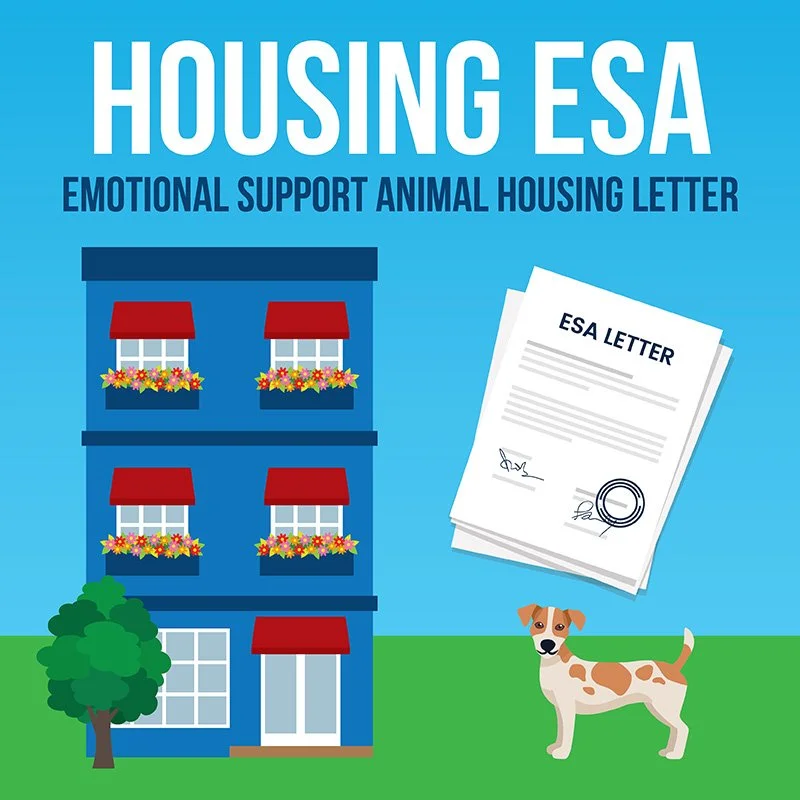For individuals who qualify, securing an ESA (Emotional Support Animal) letter is a straightforward process that begins with a consultation from a licensed mental health professional (LMHP). This letter provides legal protection, allowing you to live with your pet in your home, regardless of any pet restrictions enforced by landlords.
The Bottom Line:
An ESA Letter serves as proof that your pet is an assistance animal. This means you have the right to live with them in your home, even if your housing complex has a "no pets" policy. Essentially, an ESA Letter functions like a prescription—it's a formal recommendation from a licensed mental health professional who recognizes that an emotional support animal is an essential part of your treatment plan.
At Paw and Whiskers, we partner with a network of certified therapists and mental health professionals who are authorized to issue ESA Letters. The process to obtain one is simple: You will first be assessed by a licensed mental health professional to determine whether you have a qualifying mental health condition, such as anxiety, depression, ADHD, or PTSD. Pets provide emotional support that helps alleviate symptoms of these conditions, making them more than just companions—they’re a necessary part of your healing journey.
Legal Protection for Your ESA:
The U.S. government has laws in place to protect individuals with emotional support animals. Under the Fair Housing Act (FHA), housing providers are prohibited from discriminating against tenants with disabilities. The law mandates that housing providers offer reasonable accommodations for assistance animals, including ESAs, which are typically exempt from pet policies. The ESA Letter is the key document that validates the need for your animal’s accommodation.
What You Need to Know in 2025:
As of 2025, obtaining an ESA letter requires an evaluation from a licensed mental health professional (LMHP). Some states now enforce a 30-day patient-provider relationship before issuing the letter. There are stricter verification measures in place to ensure that the ESA letter is legitimate. While ESA letters ensure housing protections under the FHA, they do not grant the same rights as service animals, such as public access.
Steps to Get an ESA Letter for Housing:
If you're considering adding an ESA to your life, or if you have a pet that can serve as your assistance animal, follow these simple steps:
Pre-Screening Questionnaire:
Start by taking a brief questionnaire to help assess your needs and determine whether you're eligible for an ESA letter.Live Consultation:
After completing the questionnaire, you'll have a telehealth consultation with a licensed mental health professional. This consultation can take place either in person, over the phone, or through video conferencing. During this session, your LMHP will evaluate your mental health and determine whether an ESA would be a beneficial part of your treatment.Receive Your ESA Letter:
If the LMHP determines that an ESA is appropriate for you, they will issue a formal ESA letter. This letter is valid for housing requests and can be presented to your landlord to request reasonable accommodation.
Step-by-Step Process to Get an ESA Letter:
Select a Reputable Provider:
While there are many services that offer ESA letters, it's crucial to choose a provider that requires a live evaluation with an LMHP. Some providers may try to issue letters based on online quizzes, but these are not legitimate. Ensure that the service is trustworthy and complies with federal and state regulations.Complete Pre-Screening:
Before your live consultation, most services will ask you to complete a pre-screening quiz that assesses your mental health. This step helps you determine if you qualify for an ESA letter, saving time and money before moving forward.Schedule a Live Consultation:
Once you've passed the pre-screening process, the next step is a telehealth consultation with an LMHP. This professional will diagnose any mental or emotional disabilities you may have and evaluate whether an ESA would help manage your symptoms.Receive Your ESA Letter:
If you're eligible, the LMHP will issue your ESA letter. This will be sent to you digitally, with the option to request a hard copy. Your letter should include all necessary details such as the LMHP’s signature, license number, and date of issue.
Understanding What’s Included in an ESA Letter:
An ESA letter is a legal document issued by a licensed mental health professional. It will include:
Your name
A brief statement confirming your mental health condition and its impact on your life
A recommendation that an emotional support animal is part of your treatment plan
The LMHP's official letterhead, license number, and signature
It’s important to note that while your ESA letter must provide proof of your disability, it should not go into specifics about your diagnosis, as that information is protected by law.
Who Can Write an ESA Letter?
To ensure the validity of your ESA letter, it must be written by a licensed medical or mental health professional. This includes professionals such as:
Licensed counselors
Licensed therapists
Psychiatrists
Psychologists
Nurse practitioners
Be cautious of online services that offer "instant" ESA letters or sell unnecessary certifications. These services are often not legitimate and could cost you time and money.
ESA and Housing Rights:
The Fair Housing Act protects individuals with emotional support animals. Landlords must accommodate ESAs, except in a few limited situations, such as if accommodating the animal would be an undue burden or pose a health/safety risk. In general, your ESA is exempt from any "no-pets" policies.
What if a Landlord Denies Your ESA?
While it’s rare for landlords to deny an ESA, it can happen in limited circumstances. If your ESA is causing damage or harm to the property, or if the landlord can prove that accommodating the animal would cause a significant financial burden, they may be able to deny your request. If you face a denial, you can contact the U.S. Department of Housing and Urban Development (HUD) to file a complaint.
Conclusion:
Obtaining an ESA letter is a straightforward process that helps ensure you and your emotional support animal can stay together in your home, regardless of pet policies. By following the right steps and choosing a reputable service provider, you can secure the documentation needed to protect your rights under the Fair Housing Act.

